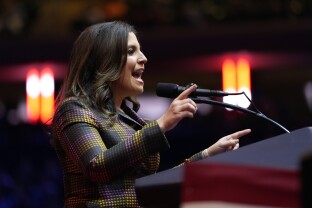Rep. Elise Stefanik, one of President-elect Donald Trump’s most loyal and vocal supporters in the House, could soon be out of Congress after Trump tapped her to serve as ambassador to the United Nations. The only complicating factor: just how slim the House majority will be in January.
Republicans are close to clinching control of the chamber. They’ve won 214 seats of the 218 needed. But because only a few seats are still uncalled, and Democrats lead in some of those races, it’s clear GOP leaders won’t have much bandwidth beyond a simple majority if they keep the House. Every single vote will matter — each illness, family emergency, delayed flight or snowstorm will threaten to derail House leadership’s plans, as will each member picked up by the Trump transition team.
Several other House members, such as Rep. Mike Waltz of Florida, have been discussed as possible additions to the administration.
Stefanik has accepted the nomination, she confirmed in a statement shared with NOTUS on Monday morning, saying she was “truly honored.” Republicans don’t seem worried about holding onto Stefanik’s New York district, which she won easily last week. But her departure will make House Speaker Mike Johnson’s job of unifying the conference and advancing an agenda even more difficult until that seat is filled. If Republicans keep the House, they want to quickly pass renewed tax cuts and border security measures.
Some members are already feeling pessimistic.
“It’s going to be hard to pass anything anyways,” said one House Republican, who asked to speak anonymously to be frank. A two-seat majority “for us is basically us being in the minority. Especially if the speaker can’t get a hold of his conference.”
Johnson will be able to rely on Stefanik’s vote for at least a couple of weeks, while lawmakers organize the new Congress and senators approve the most important cabinet positions, like defense secretary and secretary of state.
President Joe Biden’s nominee for ambassador to the United Nations was confirmed in late February, later than usual after the Senate’s work was halted to litigate Trump’s second impeachment trial. Trump’s first U.N. ambassador pick, Nikki Haley, was confirmed in a vote in late January.
Republicans are expected to have a 53-seat majority in the Senate, paving the way for Trump’s nominees to be confirmed without much pushback. Stefanik’s years defending Trump on the Hill may cause some consternation among Democrats, although Senate votes confirming this role typically receive some bipartisan support.
When Stefanik was first elected to the House in 2014 at age 30, she was the youngest woman to join the chamber at the time. She has worked to elect more women to Congress in the years since, recruiting new candidates. In 2019, she caught Trump’s eye during his first impeachment hearings, as Stefanik vigorously attacked Democrats and defended Trump.
She supported his effort to stay in power in 2021 after he lost the 2020 election, challenging lawful state results. She has described people who have faced prison time for attacking the Capitol on Jan. 6 as “hostages.”
Since last October, she has often focused on antisemitism on college campuses. Her questions for college presidents at a hearing about how Jewish students were being treated prompted one college president to later step down from her position.
“Elise is an incredibly strong, tough, and smart America First fighter,” Trump said of Stefanik in a statement.
—
Haley Byrd Wilt and Reese Gorman are reporters at NOTUS.
Sign in
Log into your free account with your email. Don’t have one?
Check your email for a one-time code.
We sent a 4-digit code to . Enter the pin to confirm your account.
New code will be available in 1:00
Let’s try this again.
We encountered an error with the passcode sent to . Please reenter your email.


